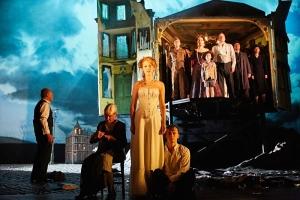An Inspector Calls Review at the Playhouse Theatre London
There is perhaps no more timely a week to engage with Priestley's socialist politics that encourages collective responsibility, social understanding and the welfare of community. His 1945 play, first performed in the Soviet Union, is a 20th century classic and one that appeals to the idealistic move towards social justice. Stephen Daldry's now iconic staging of the play returns to London following an extensive UK tour where it is set to no doubt become a staple for school groups and those studying the play on the national curriculum. For those of whom this may be their first visit to the theatre, there can be no better representation of it's stark and blunt message, amongst an expressive and well realised design that frames the story whilst giving it an added layer of social meaning.
The production broke new ground at the National Theatre in 1992, dusting off the drawing room quality of the drama and dragging it into the public psyche once again, as questions of responsibility, the big society and accepting the consequences of our actions are flaunted as timeless and important concepts. The audience finds the spotlight literally shone in their face at the top of the play, setting them up for an uncomfortable and uncompromising evening that whilst a little dated in its delivery continues to raise the important questions.
As the Birling family assemble to celebrate the engagement of daughter Sheila to the son of a business rival Gerald Croft, the family's self-congratulatory tone turns at the arrival of the mysterious Inspector Goole. Delivering the news that a young girl has committed suicide, the line of questioning leads each of the family to assess the role they have potentially played in her story, culminating in a tragic and confusing twist that has each of the family scrambling to make sense of their relationships with one another.
It's larger than life in many ways and there are times when the heightened level of the acting threatens to burst at the seams, and some tension is lost thanks to its delivery. The pacing never falters and Daldry supplies a sumptuous feast for both the eyes and the ears, underscored by a dramatic soundscape that heightens the tension further and creates a filmic quality to the drama. At times the methods and message become overly pointed and mannered.
Ian MacNeil's genius design places the family in a dolls house like construction suspended on stilts and set amongst a bleak British landscape that offers a visual contradiction to the world inside the house. Society literally pears in through the windows and as the house itself staggers under the weight of contradiction its timely explosion suggests the upheaval and social change brought about by the war, with which the Birling family and their class must come to recognise.
Liam Brennan as the eponymous Inspector is suitably probing and challenging, capturing the character's manipulation that offers each character just enough rope to hang themselves, one after the other until the vile jigsaw is complete. Barbara Marten is suitably haughty and self righteous as Sybil Birling, opposite Clive Francis' well judged Arthur Birling, played with a northern accent and subtle air of comedy that makes the family seem relatable rather than museum relics.
It is the younger generation who Priestley smothers with hope, and whilst their parents refuse to understand their admissions of guilt and any collective fault it is their children Sheila and Eric who understand that as a family they have been changed. Carmela Corbett strikes a petulant and expressive balance as the newly engaged daughter, mirrored by the tragic despair found in Hamish Riddle's damaged Eric. Together they hold the hope in Daldry's concept, and as the curtain falls behind them we can but wish them able to move on past the literal and metaphorical wreckage.
Daldry's production succeeds by simultaneously reflecting the specificities of Priestley's context and projecting them onto our contemporary world, making for a timeless presentation of this polemical drama that continues to delight and resonate in fresh and meaningful ways. Exciting, turbulent and meaningful theatre.
Originally published on
